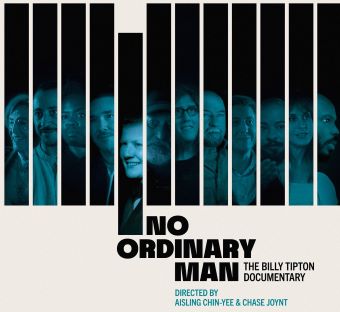BUT WHAT ABOUT TIPTON’S LIFE AND TIMES?
Billy Tipton (1914-89) had an unusual life, to say the least. Born as Dorothy Lucille Tipton, she developed into a professional pianist and occasional saxophonist. Feeling that her career could only go so far as a female, she reinvented herself as a male by the mid-1930s, using the name Billy Tipton and living the life of a man for her last 55 years. Tipton worked as a bandleader on radio, was a sideperson in several touring bands, and in 1951 formed a trio that played regularly on the West Coast, recording two albums in 1957. Offered an opportunity to lead the house band at a casino in Reno and to open for Liberace, Tipton turned down the offer, preferring to stay out of the limelight and settle in Spokane, Washington, playing locally. Tipton had nonsexual relationships with women (saying that a serious car accident had damaged his genitals). He had three adopted sons and a longtime female partner, none of whom knew that Tipton was not a male until his passing in 1989. The odd part is that female pianists in jazz were generally accepted by the 1930s (as opposed to horn players) and that Tipton would probably have had a worthwhile career without the masquerade.
Jazz Musician Billy Tipton
Playing Nov. 11-19 at DOC NYC, No Ordinary Man is an 80-minute documentary directed by Aisling Chin-Yee and Chase Joynt, produced by Sarah Spring, written by Chin-Yee and Amos Mac. The film makers had an obvious problem in making this film. There is barely any footage of Billy Tipton and, other than a brief radio interview taken from a live show, one never gets to hear his voice. Photos are seen from his life (but strangely enough nothing from his early years as a female) and just a little bit of his music is heard along the way.
Chase Joynt, Amos Mac and Aisling Chin-Yee in NO ORDINARY MAN
Dominating the film is the talking of a variety of trans masculine actors, mostly about gender issues. There are a few too many scenes of the actors auditioning for the role of Billy Tipton for a film that has apparently not been made. Nobody from the jazz world was interviewed to talk about Tipton’s musical career, and the subject matter is almost as much about the current world situation as it is about the 1940s and ‘50s when Tipton was most active.
Marquise Vilsón being interviewed in NO ORDINARY MAN
Most interesting is seeing Tipton’s wife and his son Billy Tipton Jr. in excerpts from talk shows in the 1990s when they are asked a variety of insensitive questions and do their best to defend Tipton while maintaining their dignity. Most touching is Billy Tipton Jr. in the present time talking about his father and being happily surprised that he has not been forgotten.
But while making its case for the rights of transgender people, No Ordinary Man contains a bit too little about the actual life of its subject.
No Ordinary Man
Parabola Films
playing DOC NYC November 11-19, 2020
84 mins | Canada | 2020
